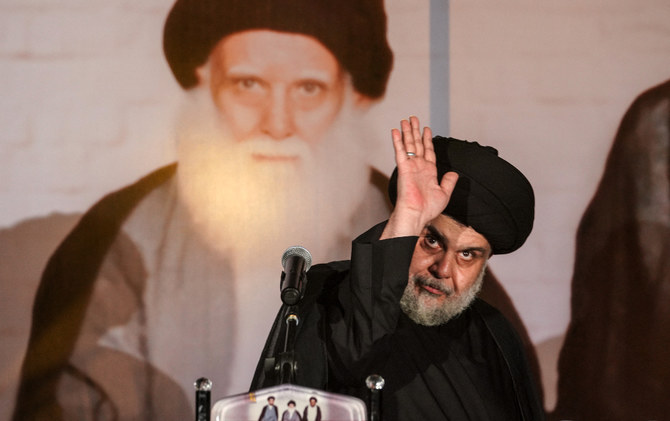JEDDAH: Iraq was on the verge of civil war on Monday after powerful Shiite cleric Moqtada Al-Sadr said he was quitting politics, his supporters stormed government headquarters in Baghdad and at least 15 of them were killed in clashes with Iran-backed militias.
“The very survival of the state is at stake,” the UN mission in Iraq warned, urging all sides to “refrain from acts that could lead to an unstoppable chain of events.” The US also called for calm.
The latest flare-up of violence began when Al-Sadr, who has widespread influence over state institutions and controls a paramilitary group with thousands of members, said he would close his political offices. “I’ve decided not to meddle in political affairs. I therefore announce now my definitive retirement,” he said.
His supporters responded by storming the government complex in Baghdad, a former Saddam Hussein palace in the city’s fortified Green Zone, ignoring an army curfew. Protesters lounged in armchairs in a meeting room, some waved Iraqi flags and took photographs of themselves, and others cooled off in a swimming pool in the garden.
Members of a rival Shiite bloc, the pro-Iran Coordination Framework, opened fire on the Sadrists, and the two groups also threw rocks at each other outside on the streets.
Protests later spread to other parts of the country, and Sadrists stormed government buildings in the southern cities of Nasiriyah and Hillah, and blocked entrances to Umm Saqr Port.
Sadr later said he would start a hunger strike in protest against the use of violance by all sides.
Iraq has been mired in political deadlock since legislative elections in October last year, amid disagreement between Shiite factions over forming a coalition. Al-Sadr’s bloc was the main winner of the election but the defeated Iran-backed factions have refused to accept the result and blocked formation of a government.
Al-Sadr withdrew all his MPs from parliament in June after failing to establish a government.
He has insisted on early elections and the dissolution of parliament, and says no politician who has been in power since the US invasion in 2003 should hold office.
Hamzeh Hadadm of the European Council on Foreign Relations said it was “not clear” what Al-Sadr’s strategy was.
“Whatever it does mean, in typical Sadrist fashion, there is always backtracking expected,” he said.
“The second, and more terrifying, thought on this is that he is giving his followers the green light to do whatever they like.”
Sadr’s supporters have for weeks been staging a sit-in outside Iraq’s parliament, after storming the legislature’s interior on July 30, to press their demands.
They were angered after the Coordination Framework nominated a candidate they saw as unacceptable for prime minister.
The Framework wants a new head of government to be appointed before any new polls are held.
Caretaker Prime Minister Mustafa Al-Kadhemi earlier this month convened crisis talks with party leaders, but the Sadrists boycotted.
Many Iraqis say the political infighting has nothing to do with their day-to-day struggles.
Iraq has been ravaged by decades of conflict and endemic corruption.
Oil-rich but blighted by ailing infrastructure, unemployment, power cuts and crumbling public services, Iraq now also faces water shortages as drought ravages swathes of the country.




























